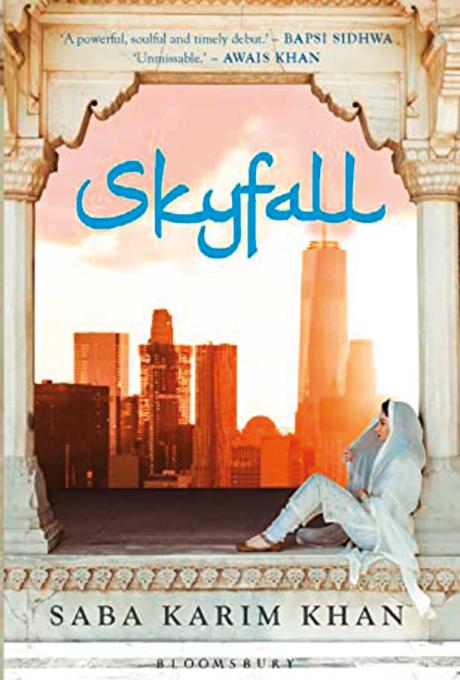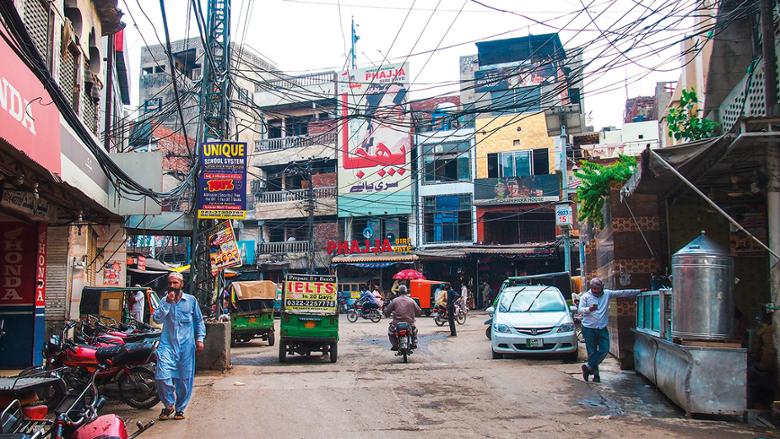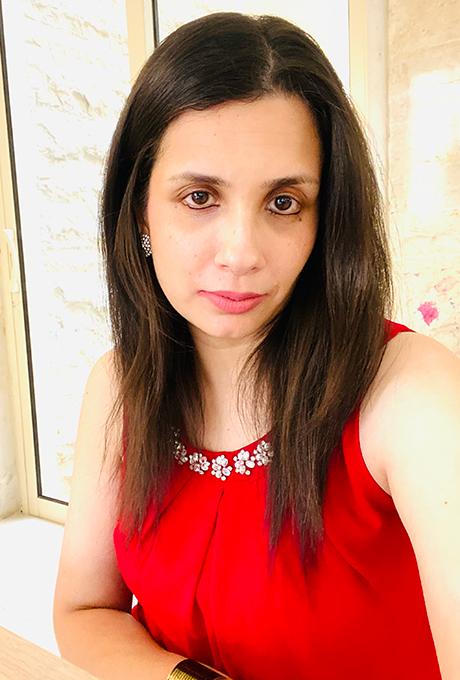Skyfall: Saba Karim Khan invites readers to imagine a world ‘much like Abu Dhabi’
Abu Dhabi-based Pakistani author and award-winning filmmaker Saba Karim Khan, whose debut novel Skyfall was published earlier this year, tells Anand Raj OK how she wrote the book during the pandemic and why it’s important to not let anyone tell you what your aukaat is
Saba Karim Khan admits that from young, she always craved storytelling.
Surely, having a father who was a professor of English literature and for whom storytelling was indispensable at home, helped. "He would speak to us [Saba and her siblings] of three books he had scripted in his head – and growing up, my ambitions became intimately bound with his," says the Abu Dhabi-based Pakistani expat whose debut fiction novel Skyfall was published by Bloomsbury earlier this year.
Nurturing a passion for storytelling, "even old-fashioned musings around a campfire, for it forges an interface with other beings and lets you create something together", Saba, however, set off on the path of crafting a novel after she attended a talk by a guest speaker at NYU Abu Dhabi.
One winter morning way back in 2017, British educator, historian and author Sir Anthony Seldon, addressing a group mentioned how "most men and women lead lives of quiet desperation, and go to the grave with the song still in them". He then asked the audience: "What is your song?".
To say the question set Saba thinking would be an understatement. "Those words shifted something fundamentally within me and they marked Skyfall’s inception that morning," says the author, who has an MPhil from the University of Oxford and has written for several international publications.
Skyfall, "a mix of fact and fantasy", takes readers on a tour of Heera Mandi, a quarter in Lahore that is known for not just its historical tourist attractions but also for its red-light district. The protagonist Rania, a 17-year-old tour guide by day and a classical singer by night, has dreams of making it big someday – a dream that takes wings when an Indian filmmaker encourages her to enroll in a music contest that could take her to New York. While she does manage to reach the US, it’s not on her dream stage that she finds herself; instead, it’s in a federal correctional institute.
"Skyfall means the last attempt you make against a group of people when outnumbered," says Saba, an Instructor in the Social Science division at NYU Abu Dhabi. "A similar spirit crystallises the world of my novel.

"Skyfall is a ‘song’ that puts you back in control, letting no one else tell you what your aukaat (worth) is. It [underscores the] possibility of amplifying our reality to fit our dreams, instead of downsizing our dreams to force-fit our reality."
An award-winning documentary filmmaker and educator, the mother of two shares her thoughts on the process of writing, and what she hopes readers can take away from her book.
Excerpts from an interview with Saba:
Tell us a little about yourself. What brought you to the UAE? And how has life here impacted your writing, perspective and thinking?
I was born and brought up in Karachi, Pakistan, and spent my undergraduate years in Lahore before going off to the University of Oxford to read Social Anthropology. I began with a corporate avatar, then moved to academia and storytelling. My husband’s job brought us to Abu Dhabi.
NYUAD really made storytelling a staple – it offered the impetus to harness this creative spirit that was latently always lingering somewhere within.
Living in Abu Dhabi, much like the writing process, feels experimental, deeply evocative and enriching. So much is waiting to be discovered; it diversified my vantage point significantly, widened the breadth of perspectives. The city offers a rare metaphor to illustrate how peaceful co-existence is possible – a theme central to Skyfall.
It lies at the cross-roads of so much: nationalities, languages, food, travel, arts and culture, permeating its borders, comingling, transmuting. Given so much of my storytelling encapsulates a similar sort of syncretism, celebrating that diversity and quiet confidence that we see in Abu Dhabi has definitely made its way into my work, especially into Skyfall. Although I should add, a story based in the Gulf deserves its own novel!
What led you to write Skyfall? What was the tipping point?
A couple of things: I grew up in Karachi, Pakistan – in a home filled with hand-written letters, books, ghazals and dreams, where a lot would be materially traded for an intellectually or spiritually uplifting experience. So, in a strange way, we were misfits because we never really learnt how material things can buy happiness. My father was a professor of English literature and storytelling was indispensable at home. He would speak to us of three books he had scripted in his head – and growing up, my ambitions became intimately bound with his.

Skyfall is a modest attempt to fulfil a large dream he always carried.
Amidst that backdrop, at my core, I’ve always craved storytelling. Too often, our jobs make us feel as if we’re cogs in a wheel, driven by the cheque-at-the-end-of-the-month; gratification and happiness become adjunct to the mechanical roster. Over time, frustration sprouts, calcifies but we train our minds to believe rerouting isn’t an option. I certainly did!
But then one winter, a guest speaker at NYU, Sir Anthony Seldon, quoted something which stopped me in my tracks: "Most men and women lead lives of quiet desperation and go to the grave with the song still in them," he said. "What is your song?" (This is a version of an original quote by Sir Henry David Thoreau). He asked us to take five minutes and scribble our song on a piece of paper, before sharing it with the person sitting next to us. Of course, it felt daunting, trying to conjure up my "song" in a matter of minutes, especially because in addition to my pipedreams, I had two tiny daughters: a one-year-old and a 2.5-week-old, vying for my attention. Still, those words shifted something fundamentally within me and they marked Skyfall’s inception that morning.
Your characters are not strictly black or white but have different shades of grey. Are they based on people you have met, or interacted with?
I suppose sanitized, black and white characters feel really last season. [Individuals are] messy, complex, even contradictory – and we need to begin embracing that chaos. With Skyfall, I wanted to take people into the inner lives of my characters, pull readers backstage, to unearth what these individuals think and say when no one is watching or listening.
Whilst the characters don’t identically match anyone, they’re derived from interactions I’ve had with people over time. Rania’s character, for instance, is deeply personal, it’s tied to the daily battles I was wrought in, as a girl growing up in Pakistan – of navigating and searching for your identity, amidst a totalitarian culture... Where talk about female sexuality was highly stigmatized... It’s against [a] deeply patriarchal tapestry that her character surges and explores the possibility of transgressions. I was keen to explore infinite shades of grey, instead of force-fitting her into predictable black and white hues.
You once mentioned that writing Skyfall offered you a certain solace during the pandemic. Tell us more about the writing process.
It felt like the unearthing of my "song" – a soulful, adrenaline-charged, nerve-wracking adventure, often isolating, and filled with the "imposter syndrome"! Overall, writing the novel was deeply immersive, and I get asked a lot about whether the pandemic helped or hindered it. I can’t sugarcoat it – in many ways it’s been a patriarchal pandemic – the burden on working mothers especially is on steroids. So, it wasn’t exactly an idyllic setting for a debut novel. We were oscillating between hoover hums, toddler tear-wiping and phonics practice, whilst trying to get Skyfall over the finish line. Yet, during lockdown, crawling back into the world of Skyfall from time to time – dialing up this vivid, visceral impression of the places, people, streets and alleys of Lahore, Delhi, New York – offered a strange solace.
Of course, the world of Skyfall is a mix of fact and fantasy, but it became a kind of getaway, an emergency exit, during a particularly harrowing year and I think that’s the transportive power of stories.
In terms of the process itself, I’m learning to embrace the fluidity and messiness of the creative endeavor. The closest analogy I can draw is with music – for example, an Abida Parveen or Nusrat Fateh Ali song, or Faiz’s poetry, which celebrates complexity and chaos but at the same time, distills from it, the simplicity and harmony of a folk melody. That’s incredibly compelling.

Over time, I’ve also become mindful about writing in an open and democratic fashion – for my stories to be accessible at different levels, to be read, agnostic to class, race, geography. I don’t want Skyfall to be stuck in some intellectual echo chamber, I’d rather a variety of people devour it, be that at a beach, before bedtime or in a post-colonial class!
Did you ever feel pigeonholed by stereotypes while fleshing out your characters particularly because the setting is Lahore?
I actually found crafting Skyfall’s characters immensely liberating, a chance to strip open the boxes we stuff Pakistanis in.
But yes, South Asian writers do get a lot of flak for pandering to tropes, for revisiting the same thematic terrain, writing about issues that feel publishable or important to the West. However, I don’t think there’s a problem with staying on that terrain – given those issues are probably front and center in our everyday lives in South Asia. For me, the more important question is – now that we have begun digging this well, how do we deepen our exploration. And that involves a delicate dance between writing about issues that embody our daily reality, yet without force-fitting our people and places into a neat, cookie-cutter template.
What do you hope readers will take away from your book?
Hope. The soul of a Sufi love song. "Skyfall" means the last attempt you make against a group of people when outnumbered – that spirit, of knocking over the bastions of power, crystallizes the novel. Skyfall is all about the movement from darkness to light, an invitation for readers to imagine a less divided world, much like Abu Dhabi, where co-existence is the currency. To show that South Asian women can be empowered in equally compelling ways, without screaming from rooftops or without the need to be rescued by someone else.
Tell us about the documentary you made. What were you attempting to highlight through your film?
Around 1.5 million children occupy Pakistan’s streets today. They’re exposed to drugs, gangs and crime, and sexual harassment. They beg and wash windscreens to secure a meal. They place their shoes under their heads as pillows and tear banners off street poles to use them as blankets in the winter. Yet, that isn’t the entire story. With Concrete Dreams, I tried to push the envelope to show how these aren’t completely rootless, adrift street kids. They are dreamers, go-getters, who in this case, went from having no birth-certificates to winning Bronze for Pakistan at the Street Child World Cup in Rio. I wanted to hammer in the fact that dreaming big, working hard to grab those dreams, becoming "Somebody", isn’t just the territory of the privileged. Filming with young boys in these neighbourhoods opened up windows into parts of my home-city, Karachi. The experience was eye-opening, as if I was being reacquainted with my place of birth and I’d never trade that feeling – finding hope, tucked in these crevices, where we imagined we’d only find despair.
Despite the many hats you wear – author, filmmaker, educator – you call yourself a storyteller first. What kind of change do you hope to bring about through your stories?
That label resonates because everything subsumes within storyteller in a medium-agnostic way – films, novels, Op-Eds, flash-fiction, poetry. Stories open windows everywhere, they enable me to touch people’s lives across geographies, religions, race; and our stories are going to outlive us. They help me unlock people’s minds, along with my own. You’re stirring them to question, feel, emote – that sort of critical thinking is the biggest gift you can get or give. In a world filled with so much hate, so many divisions, the ability to not accept things passively – it can be life changing.
As for change, whilst I may not necessarily set out with a placard to register my protest with storytelling, yet it can be a powerful medium to sometimes hold a mirror to society, to punctuate fault lines of gender and faith and class in places such as Pakistan. Whether I tell stories that are meditative and remedying or social autopsies, if they so much as make people think or spark a conversation, that’s a good place to start. Difference doesn’t always manifest in loud, preachy ways – I think storytelling enables you to create impact in quietly fierce ways as well.
Do you think the visual media is better at translating your stories than the print?
That’s a tricky one. With concentration spans depleting, visual crutches obviously attract more eyeballs. Filmmaking is also a less solitary pursuit. The power of words on paper complemented by the human imagination is limitless. It’s an act of co-creation, an invitation to dance, between readers and the story; you are welcoming people into this world without telling them how to interpret it, how to make meaning of it.
Second, at a time when we’re in the grips of the attention economy – sensational headlines, imminent threats of a bomb, a disease, climate change, the currency of fear – the form of "literary fiction" allowed me to deliver a cavalcade of piercing truth about the most pressing global issues of our time in a way that breaks through the clutter of our newsfeed or talk shows. And do this in ways that feel less preachy, without talking at readers or peddling an agenda.